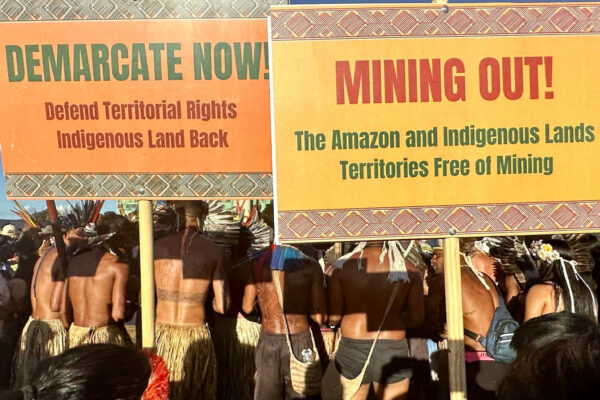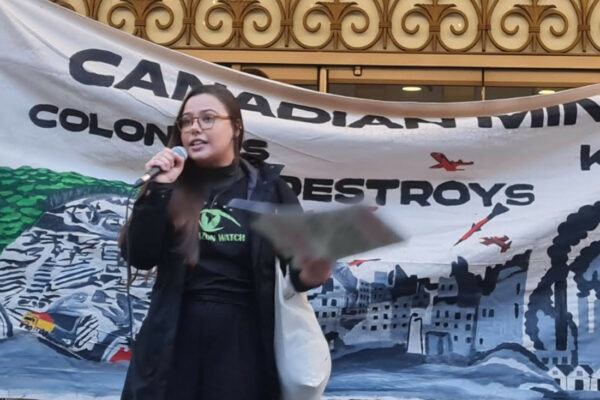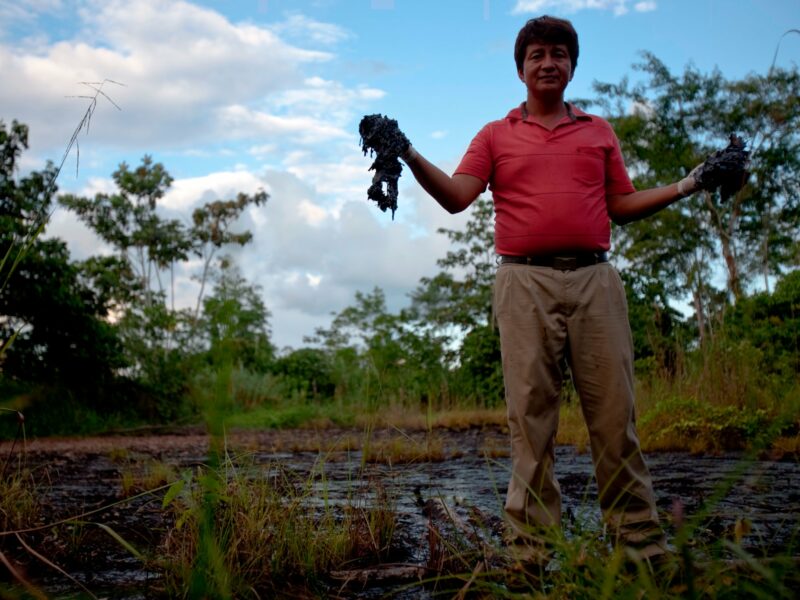Lago Agrio, Ecuador – When René Arévalo draws water from his well, it is brown and gummy, requiring him to run it through a makeshift filtering system outside his wood-plank home in the jungle outside this town.
Like thousands of other people here, he suspects the water was fouled by the waste an American oil company dumped across miles of Amazonia in its 20 years of operations. After all, he and his five children live across from a separation plant once operated by a Texaco affiliate, their house built on a mound of dirt that covered a pit where wastewater was dumped.
“If you dig here just a meter deep, you hit oil,” Mr. Arévalo said, moments after probing into the dirt outside his house to show visitors the gooey slime. “The water is contaminated, very contaminated. But we drink it. What else can we do?”
Now, about 30,000 people affected by the waste are hoping that a lawsuit, accusing ChevronTexaco of dumping 18.5 billion gallons of waste into open, unlined pits, will lead to a full-scale cleanup. This week, the California-based company, an energy giant created in 2001 when Chevron merged with Texaco, went on trial here in a case that, if successful for the plaintiffs, could establish a new way for American companies to be held accountable for environmental degradation in foreign countries.
That is because a United States Court of Appeals in New York ruled last year, after reviewing a lawsuit first filed in 1993, that the case should be heard in Ecuador. While American multinationals often prefer to have lawsuits handled in developing countries, where weak legal systems mean trials can languish, in this case the New York court said any final ruling and financial penalty imposed against ChevronTexaco would be enforceable in the United States.
“It’s an important case,” said Alejandro Garro, an expert in Latin American law at Columbia University in New York. “Once the judgment becomes final in Ecuador, then the plaintiffs, whatever judgment they get, will go to the U.S. to enforce that judgment.”
ChevronTexaco, though, vigorously denies polluting, or dumping hazardous wastes. The company says it cannot be liable because it was the Texaco Petroleum Company, a fourth-tier subsidiary that operated here, that should have been sued. ChevronTexaco also says that the Ecuadorean government has absolved the company of liability.
The company does not deny having deposited the waste that came up through the oil drilling process. Company officials argue that depositing the watery sludge in open pits was, in its time, standard operating practice. Nevertheless, Texaco spent $40 million to cap more than 200 pits and build schools and medical centers, with the Ecuadorean government certifying the cleanup in 1998.
“We’ve said from the beginning that plaintiffs failed to have presented any credible, substantiated evidence to support their claim,” said Maripat Sexton, a spokeswoman for the company in the United States. “They’ve never proved there’s been any damage caused by Texaco or Tex-Pet.”
Texaco, through the Texaco Petroleum Company, developed Ecuador’s oil industry, helping this country become an important oil producer in Latin America, a region increasingly significant as an energy source for the United States.
After arriving here in the 1960’s, the Texaco Petroleum Company drilled more than 300 wells and built a network of pipelines, separation plants and, the plaintiffs say, more than 600 pits to discard wastewater. Though in partnership with the state oil company, Texaco was the lead company in projects that produced 1.5 billion barrels of crude until 1992, when the company withdrew from the country.
But in its quest to produce oil and profits, lawyers for the plaintiffs say, the Texaco Petroleum Company systematically dumped oily waste. Another 16 million gallons of oil, the lawsuit contends, was spilled directly into the ground, rivers and estuaries, what lawyers for the plaintiffs say was 50 percent more than was spilled in the Exxon Valdez disaster.
“All of our land was destroyed and invaded, and what we got was oil camps and platforms and oil infrastructure,” said Elías Piyahuaje, a leader of the tradition-bound Secoyas, an indigenous group of fewer than 400 people. “Our rivers, which were once good, now are contaminated with oil.”
Though Ecuador had no environmental laws governing the disposal of waste – a point Texaco lawyers have used to make their case – the lawyers for the plaintiffs say the company ignored long-established practices of reinjecting waste back into wells. In the United States, most major oil companies have been reinjecting waste back into wells since at least the 1970’s.
The plaintiffs said those wastes caused maladies ranging from rashes to deformities and cancer, mostly caused from polluted waste water, since the communities outside Lago Agrio depend on the same waterways for their drinking water. No comprehensive study of the region has been done, but surveys of some communities show what the plaintiffs contend are high incidences of cancer.
The latest survey, a 1,600-page study financed by Petroecuador, the state oil company, found that of 1,017 families living near wells and pits, 957 said they were in some way hurt by pollution. Most reported that fields and streams were polluted. The survey also showed that at least 55 people had died of some form of cancer, though no comparative data has been offered.
ChevronTexaco says two independent audits done by companies contracted by Texaco found no lasting environmental damage. The company says that some waste pits were left uncapped so Petroecuador and other companies could use them after Texaco left Ecuador in 1992.
But Steven R. Donziger, a New York lawyer representing plaintiffs, said the cleanup was poorly done and that ChevronTexaco was responsible for the uncapped pits.
He said the pits remained a danger to residents, with residue leaching into the soil and water. Environmental advocates estimate that Texaco made more than $20 billion in profits from its two decades in Ecuador, but would have had to spend up to $5 billion to reinject the waste back into the ground.
“We are saying the cleanup might have caused more harm than good,” Mr. Donziger said. “People moved next to these things, thinking they have been cleaned up.”
In an hours-long trip into the countryside, the lush jungle appears untouched at first, with brightly colored parrots squawking in the distance and children playing in green fields.
But pipelines snake along roadsides, and murky pools gurgling with oily waste are easy to find. Poor farmers try to keep their livestock out of the muck, while looking for water as far away as possible from the pits. But it is not easy.
“We have to get water from the river here,” said Ligia Gaibor, 21, who is raising two small boys, about 200 yards from a murky pool. “They need to come fix this. At least cover it up because it is all covered in crude.”
That one of the biggest oil pollution trials in recent years is taking place here, in a honky-tonk border town known for its poverty and violence, was never really expected. The judicial system here is poor and archaic, based on 17th-century French law. This week, lawyers for the plaintiffs simply presented the judge with a list of witnesses who should be called.
For environmental advocates, the case is shaping up as a major fight against energy projects in Latin America. Poor villagers, organized by international environmental groups, have been increasingly fighting in Latin America against such projects as a natural gas pipeline in Peru and exploration of Amazonian rain forests here.
Ecuador is a major battleground, since Petroecuador is planning to increase its production from 230,000 barrels a day to 600,000 daily in three years. A decision against ChevronTexaco, oil analysts say, could prompt companies that are considering investing here into rethinking their position.
“This could backfire against Ecuador,” said John Lichtblau, chairman of the Petroleum Industry Research Foundation, an industry group in New York. “It depends on what kind of a trial you have.”













